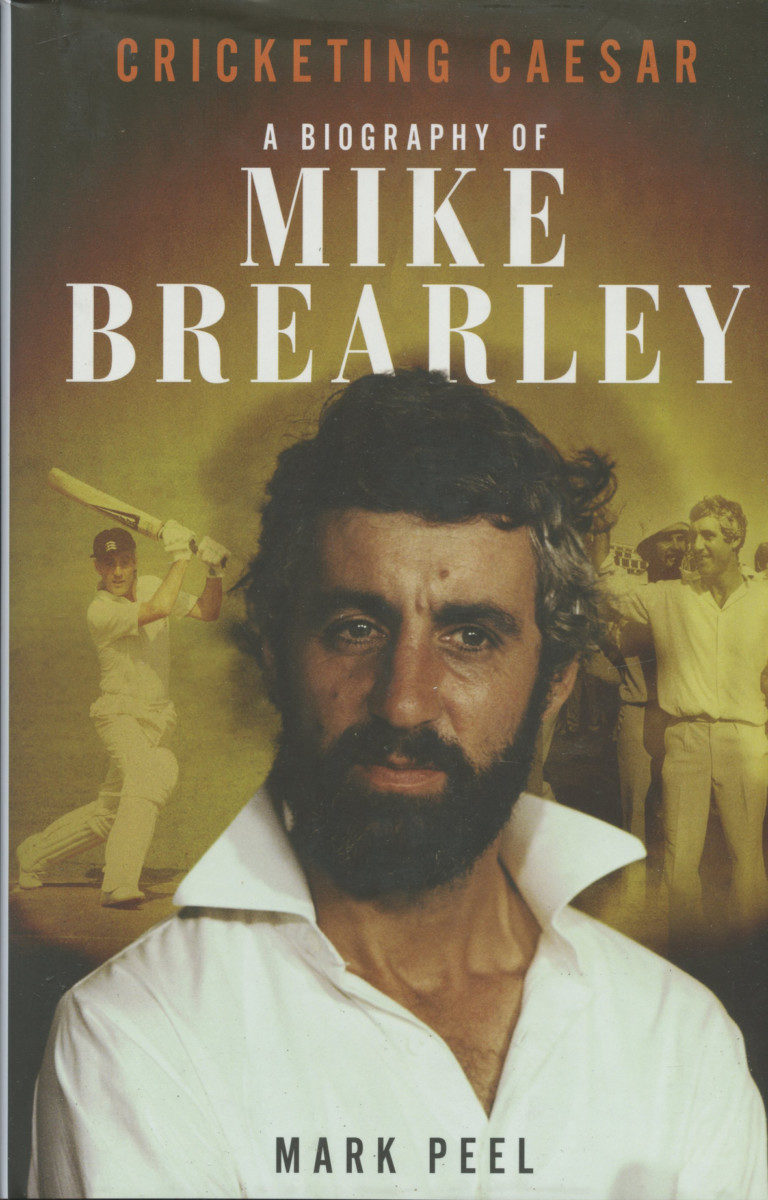Peel, Mark – Cricketing Caesar, a biography of Mike Brearley
Quality hardback with dust wrappers. New
Noted Victorian sportsman, coach and mentor KEN DAVIS assesses a new-release biography of one of his heroes, the late-blooming Mike Brearley:
Cricketing Caesar is a wonderful, intriguing insight into a man who achieved fame in the cricket world by captaining England through one of its most successful eras, despite a Test batting average of 22.9.
He was in his 35th year when he was selected by England for the first time and was to be captain in 31 of his 39 Test matches, winning 17 and losing just four. How he survived for so long was no doubt a surprise to many of us downunder used to the captain being the best player in the team.
Think Bradman, Benaud, Lawry, Ian and Greg Chappell, Taylor, Steve Waugh and Ponting… they were all superb, accomplished and well-performed before becoming captain.
Brearley, however, had a tactical gift and superb man management skills which saw him revered by so many teammates.
JM Brearley was more than just a cricketer. He was a philosopher, psychoanalyst, lover of the fine arts, a university graduate and an intellectual in a sporting world that often spurned academia.
He combined study with life as a professional cricketer which some felt may have hindered his ability to succeed technically at the highest level in cricket. ‘Had the game of cricket consumed him as it did his contemporaries such as Ray Illingworth or Geoff Boycott,’ says author Mark Peel, ‘he might have emerged as a greater player, but cricket had to compete with his academic vocation.’
Although Brearley was a highly credentialled county batsman and fine all-round sportsman, he always had lingering doubts about his ability to perform at the highest level. The doyen of cricket commentators, John Arlott became a good friend. ‘Mike often batted freely and fluently in county cricket,’ he said, ‘but when he played for England anxiety drove him constantly into over-care.’
The son of a Yorkshire schoolteacher, with a fine sporting pedigree, Brearley came from working class stock (a surprise to me), with his father the only one of eight children who was able to pursue an academic pathway. Brearley worked hard to gain entry to Cambridge University where he excelled at the Arts, while satisfying his sporting appetite in cricket, lacrosse and hockey.
A feature of this book is the extensive research of the author as he guides the reader through the many facets of Brearley’s life. From fellow students to academic leaders, to a plethora of cricket players and journalists, you gain a picture of a complex individual who was tough yet empathetic, strong minded yet inclusive and calm yet competitive.
He is portrayed as a man at home with the lovers of literature, a student of different cultures, especially India and a leader of men, many of whom had little interest in the classics but who followed and respected him in their quest for cricket dominance.
The cricket thread throughout the book keeps one engaged. As a 19-year-old at Cambridge, Brearley made 73 and 89 against a touring Aussie team, while neatly keeping wickets. This performance prompted Richie Benaud to tout him as a potential Test player while Jack Fingleton, the former Test opener and noted cricket writer thought he had seen a great batsman in the making…
Fast-tracked into a tour to South Africa, while still very much an apprentice, Brearley failed to deliver and he struggled on return to Middlesex, finding the ‘thought of playing six days a week, month in and month out, rather daunting.’
A low period followed in which time Brearley started to doubt whether he had the ability to succeed as a professional cricketer. He took a year off to study at the University of California but was invited to lead an MCC under 25 tour of Pakistan. Averaging 132 on that tour and drawing rave reviews on his leadership was a significant turning point in his career.
‘We didn’t realise how lucky we were to have a captain like Brearley,’ said Pat Pocock. ‘He communicated so well with everyone and seemed to get inside everyone’s head in a positive way.’ Alan Knott noted that while Brearley could be moody, he took an interest in everyone and captained brilliantly. Derek Underwood was another impressed by his maturity for one so young. And as a batsman he was in his element on the slower-paced sub-continental wickets.
It took several years for Brearley to commit to taking on cricket full-time. As he had committed to a lecturing position at Newcastle University, it took a disenchantment in philosophy as an academic profession and the offer of the captaincy to lure him back to under-performing Middlesex. An interesting time ensued, a feature his stormy relationship with the club’s most-seasoned professionals, especially Fred Titmus, a much-loved and regular visitor here.
Brearley’s subsequent journey to captaining many Middlesex successes and ultimately England is absorbing reading with his replacement of Ian Botham as captain heralding a colossal turnaround in the 1981 Ashes series. Botham became a superman again (a la Ben Stokes at Leeds 2019) and Bob Willis a demon, Brearley’s guidance and mentorship all-important.
We Australians, of course, didn’t rate him as a player and Peel recalled the brilliant, but inconsistent Kim Hughes who opposed him in ‘81 as saying, ‘He was the antithesis of an Australian… he had nothing going for him apart from being intelligent; and we don’t trust blokes who were too intelligent.’ After Hughes had been outsmarted by Brearley, he revised his opinion, calling his captaincy outstanding!
During this period post-Packer, Australia had two very inexperienced captains in Graham Yallop and Hughes. Both were exciting and highly talented batsmen, but neophytes in the captaincy department. I often wonder what would have happened in those series had the Aussies chosen a competent allround cricketer and intelligent experienced leader like John Inverarity to lead. He could have batted at No. 6, bowled handy left arm orthodox spinners and marshalled his team with ‘Brearley like’ wisdom and flair. It would have made for a wonderful tactical battle.
Throughout the book many players laud Brearley’s leadership style. Although he had many issues with Geoff Boycott and Phil Edmonds over his career, they both regarded him as the best captain they played under. Boycott said he was expert at blending a diverse group of characters into a successful unit, understanding that each player needed something different. Edmonds who often clashed with Brearley, admired ‘the way we were always trying to achieve something positive in the field when “Brears” was in charge. Even when the situation warranted a defensive action, it was a positive defence, with a constructive aim in mind.’
The book closes with a focus on Brearley’s life post retirement as a player. Initially reluctant to become involved in administration, in 2006 he joined the World Cricket Committee, later becoming a forthright chairman of that organisation. He also was president of the MCC. Couple that with his insightful commentary as a cricket journalist, it can be seen that Mike Brearley’s wisdom and creative insights have been and still are important.
Like me, I’m sure you’ll enjoy Cricketing Caesar. Mark Peel is an excellent writer whose previous biographies of Ken Barrington and Colin Cowdrey are excellent. If you are still involved with club cricket, you will know never to underestimate the value of having an expert captain who is always one step ahead of the opposition and will strive to shape your captain into something like a Mike Brearley.
If still in doubt then ponder this thought: who would you rather go to war with as your leader? A Geoffrey Boycott type – talented, courageous but lacking the sense of ‘team’ and strategically blinded by self-interest. Or a Mike Brearley or John Inverarity type who would make smart decisions and mould the group into a cohesive unit. Think you know where I stand!
Purchase of this book, too, will automatically expand your knowledge of the English language with many words that I have never heard of, such as ‘opprobrium’, ‘peremptory’ and ‘pusillanimity’. And that’s just three.
Aren’t you glad they sent our convict forebears down under to shape the English language into something we mere mortals can understand?
$25.00
Out of stock
Description
Hardback, with dw, 320 pages
Additional information
| Year Of Publication |
|---|
Related products
-
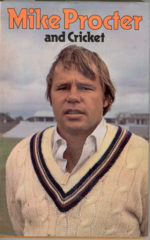
Procter, Mike – Mike Procter and Cricket
Rated 0 out of 5$11.00 Add to cart -
Sale!
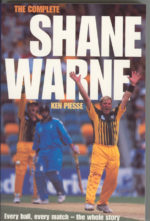
Piesse, Ken – The Complete Shane Warne
Rated 0 out of 5$16.50$5.50 Add to cart -
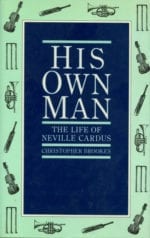
Brookes, Christopher – His Own Man, the life of Neville Cardus
Rated 0 out of 5$11.00 Add to cart -
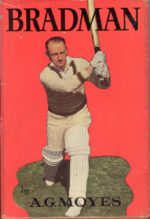
Moyes, AG ‘Johnnie’ – Bradman, original edition
Rated 0 out of 5$27.50 Add to cart

